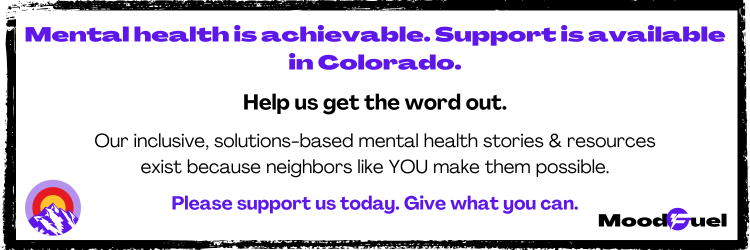By Renata Hill, Moodfuel
Of the 31 mental health-related bills introduced since the beginning of this year's Colorado General Assembly in January, two became law in April
1) Harm reduction in high schools
Signed on Apr. 22 by Lt. Gov. Dianne Primavera while Gov. Polis was away, the new law, Opiate Antagonists and Detection Products in Schools (HB 1003), will enable high school students to act as first responders for classmates experiencing opiate overdoses. They will be able to administer the opiate reversal drug Naloxone without legal repercussions nor school disciplinary action. The law also states that possession of Naloxone may not be used as probable cause to question a student or search personal possessions.
High school students in La Plata County generated momentum for this bill, and several helped craft it, after an Animas High School sophomore died from an accidental Fentanyl poisoning in 2021.
In an interview with KSJD, bill co-sponsor and State Senator Dafna Michaelson Jenet said, "This bill is all about agency. It is telling kids, 'you are smart enough, you are strong enough, you are ready to make the decisions that are necessary for you, for your friends, and in this case, in the life of your friend.'"
2) Removal of stigmatizing language from official state use
The National Institutes of Health recognizes the phrase, "excited delirium" (ExD) as a clinical description of agitated behavior, but the American Psychiatric Association said it has been misapplied and overused, particularly in law enforcement incidents involving People of Color.
As the police reform movement continues in Colorado, catalyzed by the tragic 2019 death of Elijah McClain in Aurora, state and municipal authorities are becoming more aware and intentional about official language. The Colorado Peace Officers Standards and Training unit and the Colorado Dept. of Public Health and Environment decided at the end of 2023 to remove all instances of ExD from printed and digital use. On Apr. 4, Gov. Jared Polis codified Prohibiting Term Excited Delirium (HB 1103) into law to remove the phrase from first responder training materials and official documents, such as incident and coroner reports.
Likely headed for passage
The following bills have passed through both houses and likely will head to the governor's desk.
- Continue Youth Mental Health Services Program (SB 001): continues the I Matter program and makes changes to vendor and reporting requirements.
- Mental Health Professionals Practice Requirements (SB 115): modifies requirements for licensed mental health professionals, including psychologists, social workers, marriage and family therapists, professional counselors and addiction counselors, to practice in the state. The Colorado Department of Regulatory Agencies must begin the rule-making process by Dec. 31, 2024 to bring the new rules into alignment with state statute.
- Persons Detained in Jail on Emergency Commitment (HB 1079): prohibits jails as an option for emergency commitments of juveniles and requires reporting to the Colorado Behavioral Health Administration on emergency commitments.
- Student Weight-Based Bullying Prevention (HB 1285): adds a pattern of bullying based on weight, height or body size to the list of prohibited behaviors in state law and subject to school district discipline policies and reporting requirements.
- Healthier Social Media Use by Youth (HB 1136): requires the creation of a resource bank related to the mental health impacts of social media use and mandates that social media platforms display a pop-up warning to users under 18 who are on the platform for certain lengths of time.


Did you find this legislative update helpful? Please consider supporting us so we can do more mental health reporting.




